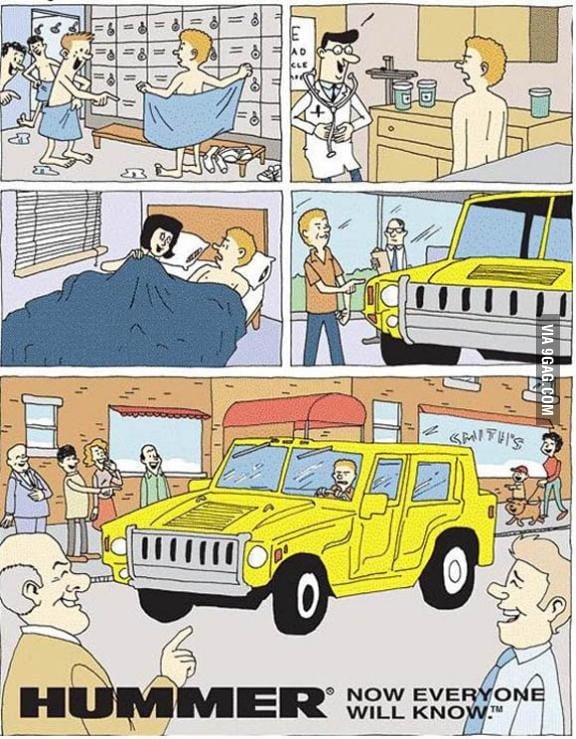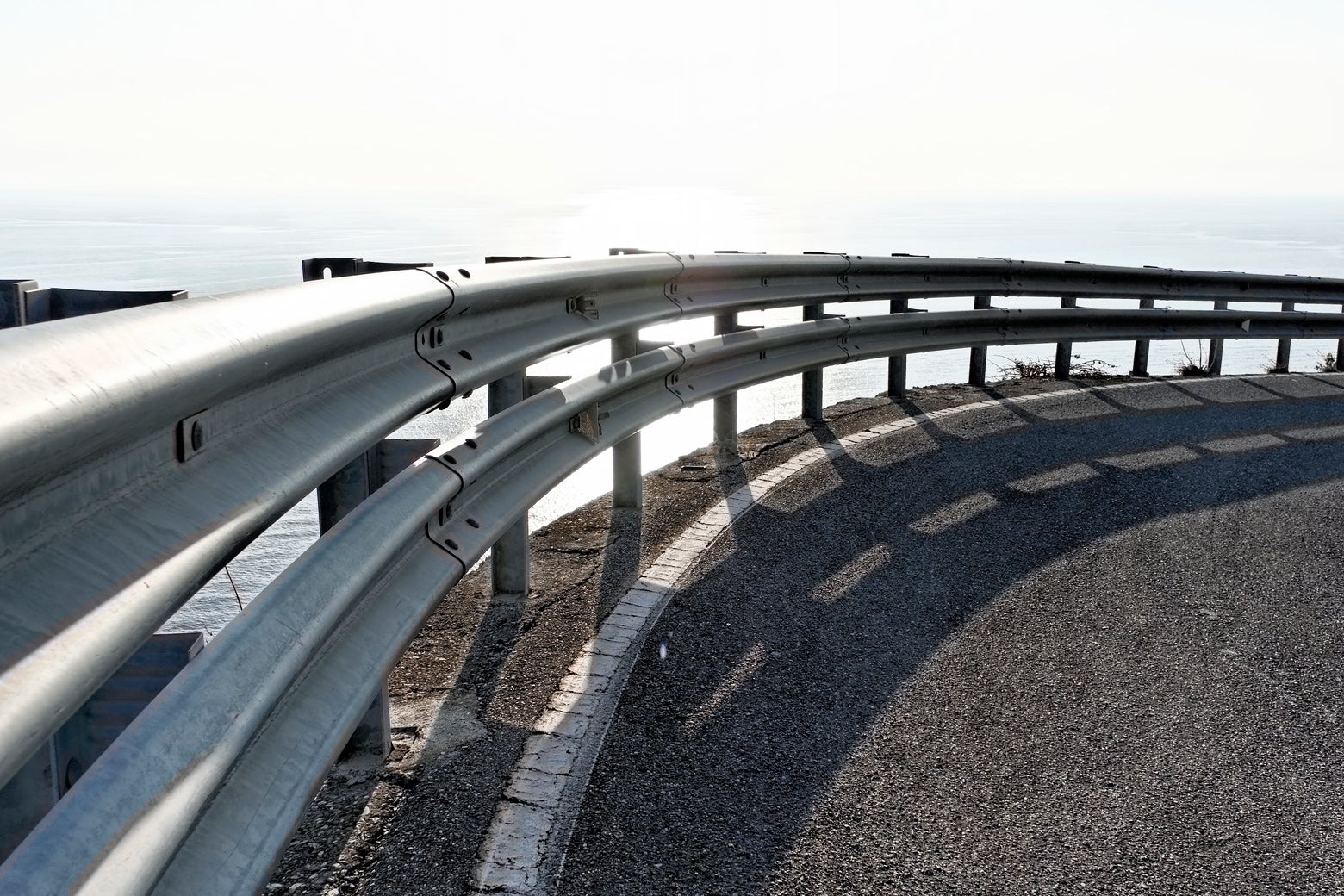- cross-posted to:
- fuckcars@lemmy.world
- cross-posted to:
- fuckcars@lemmy.world
There was a discussion a couple of years ago around gasoline taxes and how they are supposed to pay for roadway maintenance. The question came up about EVs. There were discussions about how to include EVs in the taxation system so they would pay for their fair share of the road. One of the options was to impose a tax attached to your vehicle registration based upon the weight of the vehicle. The greater the weight, the more wear and tear it produces on the road surface. This might be one solution to the barrier problem, namely moving the extra cost to the reason for the extra cost.
The “problem” with that tax is that if it’s applied fairly, it gets very big very fast. The damage to the road goes up with weight, but not linearly. Not a square factor, either. Not even cube. It’s to the fourth power.
Start applying that to long haul trucks and the whole industry will be bankrupt in a month. The implication being that we are all subsidizing that industry with taxes on roads. Including that one trucker with a “who is John Galt?” sticker on the back.
That said, this is also a very good argument for improving cargo trains to the point where most long haul trucking goes away.
And frankly, I’m really ok with this.
Trains should be the backbone for shipping. They are WAY more fuel efficient, like 3 to 4x more efficient than shipping by truck. Rail requires far less maintenance. And there’s always the option install a 3rd rail and use electricity instead of fossil fuels to ship.
Speaking of road tax, you know that bad-faith argument about how cyclists need to pay our “fair share?” Well, I would be happy to pay 1¢ for my 10 kg bicycle if everybody with a car had to pay fairly by weight4.
Maybe it’s because I don’t really know anyone passionate on either side of this issue, but I’ve never heard of this argument. I know you said it’s a bad faith argument, but I can’t really imagine what a cyclist’s fair share would be aside from maybe widening a road to add a bike lane lol
You see it a lot on in the comment sections of local newspapers or the city specific subs on Reddit.
Makes sense, that’s where my local NIMBYs hang too.
I heard it on Top Gear.
No reason the tax had to scale exactly to match the damage though. At least make it painful enough so people consider whether a larger vehicle is worth it.
What I’m suggesting is to ramp up the tax on roads over several years in order to pay for the initial outlay on new train infrastructure. Then you don’t need 90% of the trucking industry at all.
Which would be great for many other reasons.
Train infrastructure is being removed around the world - good luck convincing people to build more.
The fact is a train turns one trip into three trips - truck to the railway station, train to another station, truck to the final destination. That often adds days to what otherwise might be a 3 hour delivery - because trains are only cheap if you send about a hundred or so trucks full of cargo on a single trip.
Only really makes sense for really long trips but more and more of those are done by ship or airplane. Trucks aren’t going anywhere.
What if it’s not a larger vehicle, but transitioning from a petrol burning vehicle to an electric vehicle?
We don’t want to give people reasons to hold on to old combustion vehicles any longer than they have to, but the roads of course need to be made safe for passengers and pedestrians and wildlife, I agree.
If they hold on to their existing vehicle than thats just another upside. If they buy a new gasoline car instead of an EV this is bad. But EVs dont have to be insanely heavy if we stop the whole cars getting bigger and bigger and bigger and bigger crap. They will still be heavier than their gasoline counterpart but one solution might be 2 tax brackets: One for gasoline cars and one for evs that has the same taxation levels but allows for, lets say, 500kg more weight in them
So much of that freight should be moved by rail.
Tax based on weight to 4th power would work if we nationalized railways like roads.
Only if rail can figure out their shit and hire enough workers and give them all time off. Too many train derailments from precision scheduled railroading.
Actually maintained rail shouldn’t have this problem, but the private companies like Norfolk Southern spend the minimum amount to keep them operational.
With a budget just a fraction of highway upkeep and expansion they should be able to be kept in good repair.
Why bother with maintenance when the EPA handles the cleanup?
Yeah, I think turning highways back into methods of travel instead of “rolling warehouses saving Walmart a few bucks not storing anything on site” is a good thing.
There’s no need to have the tax be the exact same for every vehicle class. Proper long haul trucks have to be heavy, private cars do not.
The US already has 8 or 10 different vehicle classes defined by weight, the lightest being 6000lbs (which is still ridiculously high, my VW Up is 2200lbs).
In Australia (and I assume other similar countries) trucks have tax concessions to avoid the cost of food fluctuating too much with the cost of diesel. This tax doesn’t need to be any different.
Oh well. I guess they’ll just have to go bankrupt then.
And now you starve. None of the stores will stay open long without them.
Think of the shareholders!
Long haul trucking shouldn’t exist.
Neither should lots of short haul trucking, more specifically drayage trucking, that industry sucks. We probably need to move more towards vans and stuff.
To be fair, it’s the fourth power of the axle weight, not vehicle weight. So it’s not as extreme for long haul trucks as you make it sound, but still much higher than for a car
Trucks already pay a lot more in tax and regulatory expenses. In my state, annual car registration is $30-ish. Annual registration for a full-sized 18-wheeler is $1350 for the truck and $30-300 for each trailer. They also have to pay annual fees at the federal level which can be $600+/year, and an additional fuel tax on top of the existing state sales tax on diesel which I don’t know the rate of right now. All of that applies to every single power unit and trailer in a fleet.
Trucks should be taxed much higher than cars, but too many people don’t know or just don’t care that this is already the case, and it has been this way since the 1940s.
They are taxed a lot. Are they taxed to the fourth power of axel weight? Not even close.
Based on your math, you’d be charging almost $2 million per year per truck. With that much money, you’d be building an entire nations worth of brand new infrastructure several times over each year.
There was a discussion a couple of years ago around gasoline taxes and how they are supposed to pay for roadway maintenance.
I just want to point out, even if they’re supposed to, gas taxes do not pay for roadway maintenance, not by a long shot
deleted by creator
Sorry, the tax is a great idea but taxing the tires is a terrible idea.
I think he is close though with his initial train of thought. I remember doing some research on this many years ago and road wear does not scale linearly with weight. All other variables being equal a 1,000lb load going across a stretch of road 10 times does less damage than a 10,000 pounds load going across the same stretch once. So what we should really be doing is looking at semi trucks and the heaviest of consumer vehicles. It would theoretically make consumer goods go up in price a little, but it’s not like that cost isn’t already being paid/subsidized by consumers in other ways.
Maybe it would even push the use of railroads for goods even more than it is used now.
Some states do exactly that, or did back in the day. 30-years ago in Oklahoma, an old 2-ton dump truck with an antique plate was $20, a new Corvette $600. I think Texas flipped that and charged by weight vs. value.
ah yes, another anti-environment tax. More barriers to fossil-fuel free adoption. As you would expect, Mississippi already has this tax. Don’t be like Mississippi.
Wouldn’t be anti-environmental… it would be for all vehicles including ICE and commercial, as well.
Then add some exceptions to cars that aren’t as bad for the environment like electric cars.
Maybe exclude batteries for the weight calculation.
It isn’t a hard problem to solve.
And the heavy vehicles get classified as light cargo so are largely exempt from those taxes. They’re promoting and building heavy “cargo” vehicles specifically because they get exemptions for fuel efficiency and taxes (depending on location).
In the country I reside, everyone pays for the roads through income tax. Vehicle owners pay emissions tax. I think this is fair since everyone relies on the roads even if they never travel down a road themselves.
You can still tax large vehicles, because everyone bears the cost of having them around.
An alternative idea that I mentioned on a thread yesterday about vehicles with high bumpers, adjust the license class system to be more strict regarding vehicles. You already have to have extra training in a different license to run transport vehicles or semi trucks you should have to do the same with large vehicles, I’m not saying ban every pickup truck out there because I fully agree that trucks are a hard requirement especially in snow covered States like mine but there is a difference between having a pickup truck and having a monster truck at least in my opinion heavier or taller than low end transport vehicles
Agreed, there’s also plenty of people who think that just because they have a large vehicle, that they’re immune to the snow. Obviously there’s a quantity of snow that trucks are more necessary for, but I’ll admit to feeling a bit smug when I see ditches full of abandoned trucks and SUVs, as I drive by in my little front wheel drive sedan.
Every mile an EV drives is already taxed as we already tax electricity consumption. There is no reason to add a tax for something already taxed.
Yeah well let’s quit making 7000 pound consumer vehicles. Small EVs would be more efficient and better for the environment because they need less materials to build and and less energy to recharge.
Judging by the general trend I don’t think this is happening anytime soon. The overall car industry is obsessed with even bigger cars.
And even in Europe it is sickening to see those half buses on our roads. And this is especially true for big cities, where parking space is very limited and usually those cars occupy park space for 1.5-2 cars.
And knowing that the fertility rate is really going down I wonder what justifies those cars.
That’s because the USA subsidizes bigger trucks as “work vehicles”. This practice needs to stop and they need to be taxed more than smaller vehicles.
I’m guessing you don’t actually pay attention to the tax law, then. Annual vehicle registration (aka, a vehicle ownership tax) is more expensive as the weight on the vehicle goes up. Vehicles over a certain weight limit require more complex and strict drivers license classes (granted, class B starts at 26,001 lbs which is way higher than even today’s heaviest consumer cars), and any vehicle used for work has higher insurance and regulatory costs, regardless of the size.
Buying an F350 (a truck that really only has a place in very specific situations anyway) requires so much extra work and almost always requires a class B license because of the kind of work being done with it. People who choose to get something like that because of small-dick syndrome are idiots. And that’s coming from a person who used to drive 18-wheelers and still has a compact SUV as my daily driver.
See my post above in the thread where I show the laws I am talking about and cite source.
That’s because the USA subsidizes bigger trucks as “work vehicles”.
Can you cite this? Don’t get me wrong, I understand that if it’s actually a work vehicle you probably get some tax credits/breaks, but I highly doubt many consumers are getting these breaks for buying large vehicles.
https://youtu.be/jN7mSXMruEo?feature=shared
Not op, but I really liked this video, as it explains quite a bit. It is of course a biased video, but still…
I watched most of the video, it’s primarily about safety. It’s says the growth is mainly due to the regulations not applying the same to light trucks, which SUVs are classified as. This seems to contradict the claim that I was asking about.
If there is something about the state subsidizing the vehicles and I missed it, I would appreciate a time stamp. Noone needs to convince me that suvs are unsafe and an environmental disaster.
In Australia it breaks down thusly. (for reference average wage is about $80k per annum).
If you buy a vehicle for $50k, you’re entitled to claim a tax deduction for that cost, usually spread over a number of years.
However, if you buy a vehicle for $100k, you’re only entitled to claim a tax deduction for the first ~$56k (changes each year), unless the vehicle has a large enough carrying capacity that it can be considered to have been designed for the purpose of carrying stuff rather than people.
This rule is designed to disallow deductions for wanky vehicles. Like why should someone be allowed a deduction for driving a wanky mercedes SLK when a cheap and chearful toyota camry can perform the same task of moving a taxpayer from point A to point B. Of course, if someone buys a $300k prime mover (tractor?) designed for hauling 90 tonnes of wheat from a farm to a port, it’s just not possible to do that with a toyota camry so you should be entitled to claim the entire cost.
Suppose you have 2 vehicles, both costing $100k, one is a regular sized Toyota truck, and the other is a ridiculous RAM truck or something. Suppose you plan to sell whichever you buy, after 8 years or so, when it’s value is $50k.
On the Toyota you can only claim a tax deduction on the $6k difference between the $56k notional purchase price and the $50k sale price, which if your tax rate is about a third then you save yourself $2k in tax, so the vehicle cost you $48k to own for 8 years.
On the RAM you can claim a tax deduction on the entire $50k difference between the $100k purchase price and the $50k sale price. A third of that is ~$16k, so it only cost you $34k to own that vehicle for 8 years.
See my post above with citation.
There was once a legend about vehicle’s size and … Well…

I would pay money to have this physically mailed to everyone. I have money because I have an economy car.
Yeah because emission standards are based on size and weight. So why spend the money making environmentally effective equipment when you can just make everything bigger and still rake in money?
Congratulations, the fossil fuel industry just put a hit on you
Small PHEV’s would be ideal for the current generation. Battery advances will come, but we should always try to optimize with the current technology and 10 cars with a 10th the battery of a Tesla would be better for the future.
I do want to see more efficient, smaller EVs, but no one wants an EV that only gets 50 miles per charge. They aren’t worth producing from the manufacturer’s perspective.
My 2016 Nissan Leaf is 4400lbs, which is more than my larger (but still not that big) 2016 Mazda CX-5 at ~3500lbs. Both manage to fit my family of 5, but the Leaf is far less accommodating and it weighs a good deal more. Small EVs are still pretty substantial. A Kia EV6 which is roughly the same size as my CX-5 weighs 5500lbs. You add a lot to a vehicle when you add an EV battery.
The article has a link to EVs by weight all but two of them were under the threshold.
Tldr most guard rails are designed to stop vehicles under 5000lbs. Passenger vehicles are starting to exceed that, and EVs can weight 30% more than ICE vehicles.
How about keeping the guard rails as they are and let the fat car drivers carry the risk?
Even US drivers are not quite heavy enough to make a significant difference here. This has to do with car battery weights.
I don’t think they are saying that the drivers are fat. Or at least it would be insane to say that society shouldn’t care about the safety of fat people.
It’s more likely that they said that the cars are fat which they are.
What about trying to reduce deaths?
Yeah you say that now but when that article comes out about all those kids in a SUV dying you will be upset that the government cheapened out.
That’s 3175 kg for non-free folk. My car has around 1600 kg. 7k pound car is a fat fat cow.
I prefer the term wildling.
It’s the battery, and the support frame to carry the weight of the battery safely. Like it or not - cars are getting heavier.
It’s a big fat fucking truck or luxury suv with a battery. A normal sized electric car is a thing too, you know. Electrics will always need to be heavier than ice of same size and model, but that doesn’t mean it needs to weigh 3000kg. Car are growing heavier and bigger not just because of electrification, but because of growing fragile egos and growing fears in a vehicle arms race.
Trucks and SUVs are getting heavier to skirt emissions controls.
In 2010 the Obama administration passed laws tightening emissions control requirements for new vehicles. But the laws were written to allow emissions as a factor of vehicle size, larger vehicles were allowed to have more emissions.
Unfortunately, the plan backfired. Instead of reducing emissions, vehicle manufacturers just started making vehicles bigger.
It isn’t primarily the fragile egos that are driving sales of these vehicular monstrosities. It’s corporate profits and greed. Manufacturers aren’t making smaller models because they don’t make as much money on them, not because there isn’t a market for them.
Just get an even bigger car, it will keep you safe from those.
Canyonero!
The country-fried truck endorsed by clowns!
Somehow I hadn’t seen it before. Thanks!
That’s why I get everywhere by bus.
7000 Pounds is 3.2 Tons (metric)
3.2 Tons
geez, i wonder why these guardrails wouldn’t work on a fucking Truck
We just need to not have these big ass trucks for the general public. You don’t need a ford 350 with rims jacked up to show you have money. You are a pavement princess.
“But I need it for my work!”
You don’t even have a toolbox on it. If it was an actual work truck, it would be a pickup with the bed replaced with one of those toolbox beds. Or you’d have a sprinter van like the actual plumbers and carpenters around here.
All those tiny penis trucks are so funny, there’s never a single spot of mud or dirt inside the wheel wells, and they put mud tires on to drive around on pavement! It’s like … hmmmmmmmmm what happened to your brain?
This becomes a self-reinforcing cycle. If there are 7000lb passenger trucks on the highway around my compact car, I maybe start wanting to get a larger vehicle myself to protect myself from the idiots who drive them.
There has to be some sort of incentive either for smaller cars or against larger cars. Currently you can go into a dealer, tell them you want the biggest baddest truck/SUV that they have, and buy it all while having a normal license.
You’d only be paying a slight premium on whatever road or fuel tax if that while having the benefit of not getting destroyed in a car accident. As it stands, there is little reason to buy a larger vehicle unless you actually don’t like driving a car that big.
Easy. Slap on an annual registration fee directly proportional to weight. Shit, just make it half the sale weight of the car for any non-EV, and half that again for EVs. Peg the ratio to inflation after that.
Weight should absolutely be a factor in registration fees. Between road damage, their environmental cost, and danger they pose it’s a no brainer.
Sort of.
It’s either giant trucks, or Subarus.
My first car had a curb weight of 2400 lbs. It’s absurd how fucking huge these planet-destroying, environment destroying, life destroying monstrosities have become.
Stupid post. 60,000 lb semi laughs.
Seems like we need some regulation for maximum car weight to be. It’s a safety thing now
Oooohh yeeeaaaahhhh!!!
Natural selection
Sounds like A Nice Morning Drive. As noted in the archived page above, that story inspired the song Red Barchetta by the band Rush.

Seems like we need some regulation for maximum car weight to be. It’s a safety thing now



















